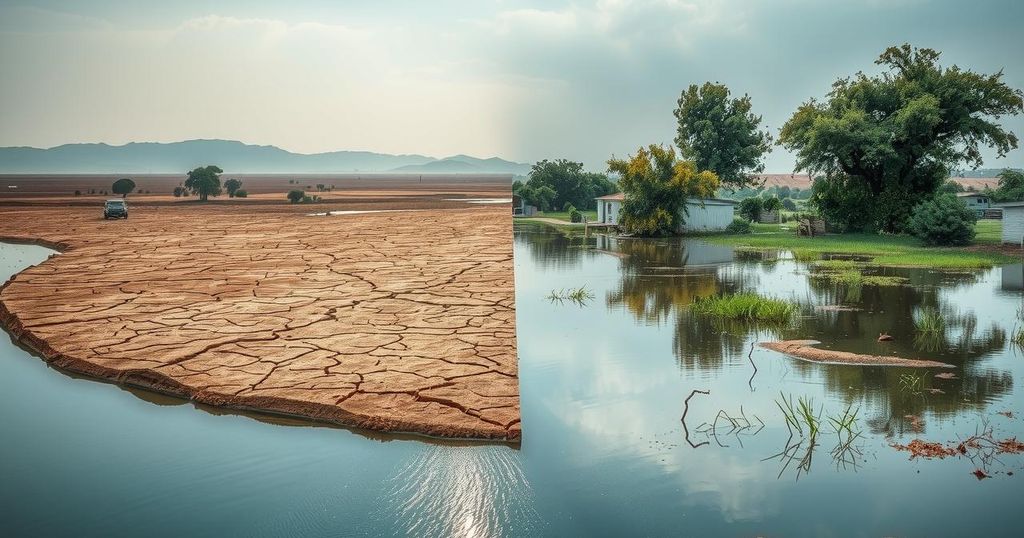The Sahel and Lake Chad region is experiencing a severe humanitarian crisis due to floods, conflict, and climate change. Essential support is desperately needed for affected populations, as flooding devastates agriculture and access to education. Many communities face dire conditions, with the response efforts currently underfunded. Immediate international assistance is crucial to help mitigate vulnerabilities and prepare for future crises.
The Sahel and Lake Chad region is facing a worsening humanitarian crisis stemming from the combined effects of conflict, displacement, and climate change. According to Hassane Hamadou, the regional director for NRC, the immediate goal is to provide essential support, including shelter, food, and hygiene supplies, to the affected populations. He also emphasizes the necessity of long-term strategies to enhance infrastructure and resilience in collaboration with local governments.
In countries like Cameroon and Niger, communities adjacent to the Lake Chad Basin are grappling with climate-induced disasters, significantly exacerbating existing conflicts and displacements. The frequency of severe floods is increasing, leading to destructive humanitarian outcomes annually. These floods have devastated farmlands crucial for food security, further endangering livelihoods and access to education as many schools have been damaged or repurposed for shelter.
Victims of the floods, such as Modu from Maiduguri, Nigeria, share harrowing accounts of their struggles. Modu stated, “We lost the majority of our livelihood in the water, and the speed of the flow didn’t allow us to take any significant property with us.” He is actively aiding others in need while witnessing the destruction of their homes helplessly.
In Mali, the ongoing lean season has left communities on the brink of famine, as families reliant on subsistence agriculture have been rendered destitute due to floods. Immediate intervention is critical to avert a deeper crisis. Humanitarian organizations are working tirelessly to provide relief amidst dwindling resources; however, the 2024 Humanitarian Response Plan for the Sahel is only 25% funded.
Hamadou reiterated the urgent need for the international community to step up funding for both emergency assistance and long-term recovery efforts. “These severe floods are a stark reminder of the Sahel and Lake Chad region’s vulnerability to climate change, which may only worsen in the nearby future,” he stated.
As of the end of August, floods have affected over 2.3 million individuals in West and Central Africa this year, displacing numerous families and resulting in significant fatalities and injuries. Specifically, 354,000 hectares of agricultural land have been compromised, making additional areas unsuitable for farming.
The humanitarian crisis requires immediate global attention to ensure funding and resources are made available to impacted areas. The precarious situation in the Sahel and Lake Chad region highlights the dire need for long-term planning and increased preparedness for natural disasters.
Overall, as communities continue to face these overwhelming challenges, it is imperative that both local and international actors collaborate effectively to mitigate the situation and foster resilience against future disasters.
The Sahel and Lake Chad region has been increasingly exposed to the compounded impacts of climate change, conflict, and displacement. Throughout the years, communities have struggled to maintain their livelihoods amid severe flooding and humanitarian crises. The areas most affected are reliant on agriculture and pastoralism, making them particularly vulnerable to environmental disruptions. As relief efforts remain underfunded, the need for comprehensive planning and support becomes all the more essential for survival and recovery.
In conclusion, the combination of climate change and socio-economic challenges in the Sahel and Lake Chad region demands urgent international support. Local communities have been overwhelmed by severe flooding, which has intensified existing vulnerabilities and led to dire humanitarian consequences. With funding for relief efforts lacking, it is critical that global actors commit to supporting affected populations and implementing long-term recovery strategies to enhance resilience against future disasters.
Original Source: www.nrc.no






